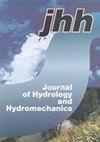Adaptive stochastic management of the storage function for a large, open reservoir using learned fuzzy models
IF 2.4
4区 环境科学与生态学
Q3 WATER RESOURCES
引用次数: 1
Abstract
Abstract The design and evaluation of algorithms for adaptive stochastic control of the reservoir function of a water reservoir using an artificial intelligence method (learned fuzzy model) are described in this article. This procedure was tested on the Vranov reservoir (Czech Republic). Stochastic model results were compared with the results of deterministic management obtained using the method of classical optimisation (differential evolution). The models used for controlling of reservoir outflow used single quantile from flow duration curve values or combinations of quantile values from flow duration curve for determination of controlled outflow. Both methods were also tested on forecast data from real series (100% forecast). Finally, the results of the dispatcher graph, adaptive deterministic control and adaptive stochastic control were compared. Achieved results of adaptive stochastic management were better than results provided by dispatcher graph and provide inspiration for continuing research in the field.基于学习模糊模型的大型开放水库蓄水函数的自适应随机管理
摘要本文介绍了一种基于人工智能方法(学习模糊模型)的水库水库函数自适应随机控制算法的设计与评价。这一程序在Vranov水库(捷克共和国)进行了试验。将随机模型结果与经典优化方法(差分进化)的确定性管理结果进行了比较。用于控制水库流出的模型使用流量持续时间曲线值的单个分位数或流量持续时间曲线分位数值的组合来确定控制的流出量。两种方法都在真实序列的预测数据上进行了检验(100%预测)。最后,比较了调度图、自适应确定性控制和自适应随机控制的结果。所获得的自适应随机管理结果优于调度图的结果,为该领域的进一步研究提供了启示。
本文章由计算机程序翻译,如有差异,请以英文原文为准。
求助全文
约1分钟内获得全文
求助全文
来源期刊
CiteScore
4.20
自引率
5.30%
发文量
30
审稿时长
>12 weeks
期刊介绍:
JOURNAL OF HYDROLOGY AND HYDROMECHANICS is an international open access journal for the basic disciplines of water sciences. The scope of hydrology is limited to biohydrology, catchment hydrology and vadose zone hydrology, primarily of temperate zone. The hydromechanics covers theoretical, experimental and computational hydraulics and fluid mechanics in various fields, two- and multiphase flows, including non-Newtonian flow, and new frontiers in hydraulics. The journal is published quarterly in English. The types of contribution include: research and review articles, short communications and technical notes. The articles have been thoroughly peer reviewed by international specialists and promoted to researchers working in the same field.

 求助内容:
求助内容: 应助结果提醒方式:
应助结果提醒方式:


